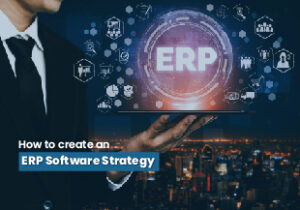An ERP Enterprise Resource integrates various business functions and processes in one integrated system which helps various organizations. Organizations are looking for ways to increase operational efficiency. Improve work procedures and continuously increase productivity in an effective way . It can manage and automate operations more efficiently. In this article we discuss how to maximize efficiency with ERP Enterprise Resource.
Understanding ERP (Enterprise Resource Planning)
It is a comprehensive software solution that perfectly integrates different business processes into one platform like finance, human resources, production, sales, purchasing, inventory management.The solutions of this software are engineered to allow free flow of information across the organization. Different departments are ensured to work with consistent, accurate, and up-to-date data. It does break silos, reduce most manual errors, and enhance communication between different teams. ERP software can help an organization in many ways once this integration has successfully achieved automated tasks, gathering difficult data, and enhancing decision making through insights in real-time.
Features of ERP System
- Centralized Database: All functions of the business are based on a central database in this system. This ensures that the information is available across all departments, which helps in interdependence and transparency.
- Automation: All routine tasks such as order processing, inventory tracking, payroll, and billing are automated in an ERP system. This reduces the workload on employees and minimizes human error to achieve faster processing and lower errors.
- Real-Time Data: Giving real-time data analytics helps make decisions by managers and executive persons based on the latest available data. This also helps a great deal in improving planning and forecasting.
- Scalable: Modern ERP solutions come as scalable, meaning that they can grow with your business. When expanding this system can accommodate new processes, additional users, and more data without compromising performance.
- Customization: The customization of an ERP system is very high, meaning businesses can modify the system according to their requirements. Starting from customizing reports to designing workflows, a business can tailor its ERP system to its specific needs.
Benefits of ERP Systems in Maximizing Efficiency
Improved operational efficiency:
It is the top priority for implementing an ERP Enterprise Resource system. With manual tasks automated, processes streamlined, time allocated to administrative activities decreases, and there are more hours directed toward core business functions.The entire process of supply chain, from order receipt to replenishment of inventory, can be automated using an ERP system. This results in quicker order fulfillment, fewer stockouts, and better management of resources.
Enhanced Data Integrity:
Intraday data entry leads to errors. These errors then lead to missteps, improper decision-making, and even financial loss. An ERP system ensures that all data is entered once and automatically reflected in every appropriate area of the business. Errors are thus minimized with accurate and consistent data.
Better Decision-Making:
An ERP system gives real-time data directly to decision-makers to understand the performance, trends, and future outcomes much more effectively. Better business decisions with an accurate and timely basis enable the organization to stay ahead of the competition.
Cost Savings:
By automating processes, reducing errors, and optimizing resource allocation, ERP systems help businesses reduce costs. For example, an ERP Enterprise Resource solution can provide insights into inventory management. Helps businesses avoid overstocking or overstocking products This can result in lost sales or excessive inventory costs.
Improved Collaboration And Communication:
ERP systems connect all departments. Facilitate effective communication and collaboration across the organization. Members can easily access shared information. Thus facilitating easy communication. and avoid misunderstandings or delays. This approach is especially important for businesses with multiple departments or locations.
Compliance And Risk Management:
Business ERP systems are designed for compliance with industry regulations. This is often done through built-in features that ensure data security, track regulatory requirements, and provide audit trails that reduce the risk of potential non-compliance and potential legal issues.
Best Practices for Maximizing the Efficiency of ERP Systems
An ERP system has many advantages, but the real power can be realized only when it is installed and used appropriately. Here are some good tips that help organizations get the most out of their ERP Enterprise Resource:


Define Clear Objectives:
Organizations must know the goals before they start any ERP system. It may be having better inventory management, or making finance operations easier and simpler, or improving the customer service level. So, these objectives will facilitate the setting up of an ERP system to cater to a business’s specific needs.
Choose The Right Erp Solution:
Something that works for one business might not work for another. Therefore, companies need to check various systems considering points like how well it grows, options for customization, features fitting the industry, and how easily it can connect with current systems.
Involve Key Stakeholders:
Involve Important People Involve important people from any departments like IT, financial, human resources, and operations teams to ensure that the outcome of this software implementation comes out well. Their perceptions will enable this software to fulfill each department’s detailed needs and assist the organization in realizing its overall objectives as well.
Provide Adequate Training:
An ERP system might be complex and workers may take their time to get accustomed to the same. Complete training ensures that users are easy with the system and this helps prevent mistakes and problems. It allows employees to make the best use of this system can do.
Ongoing Checking and Improvement:
This system should not be perceived as a one-time solution. In order to derive the best efficiency, businesses must continually check how the system is working and then rectify problems with appropriate updates or improvements, including the addition of new features, adjustment of workflows, or connecting to new technologies.
Data Security and Backup:
In any business, the most important data safety is of prime importance, and an ERP Enterprise Resource usually contains key data. Organizations should focus on strong security steps like encryption, firewalls, and periodic data backup to prevent data breach or loss.
Increasing Efficiency With Prismatic ERP Systems
Prismatic has s a powerful software that allows businesses to fine-tune their processes through with advanced features Enterprise Resource Planning system. It brings all the necessary functions, like finance, operations, and human resources, into one central platform and helps increase efficiency and enhance communication in organizations. It simplifies workflows, removes data silos, and provides real-time insights into important metrics. This enables managers to make better decisions, break through operational bottlenecks, and promote growth. Prismatic’s characteristics of scalability as well as customization further enable it to adapt to the varied needs of a business by offering a comprehensive solution for companies looking to upgrade their performance.

